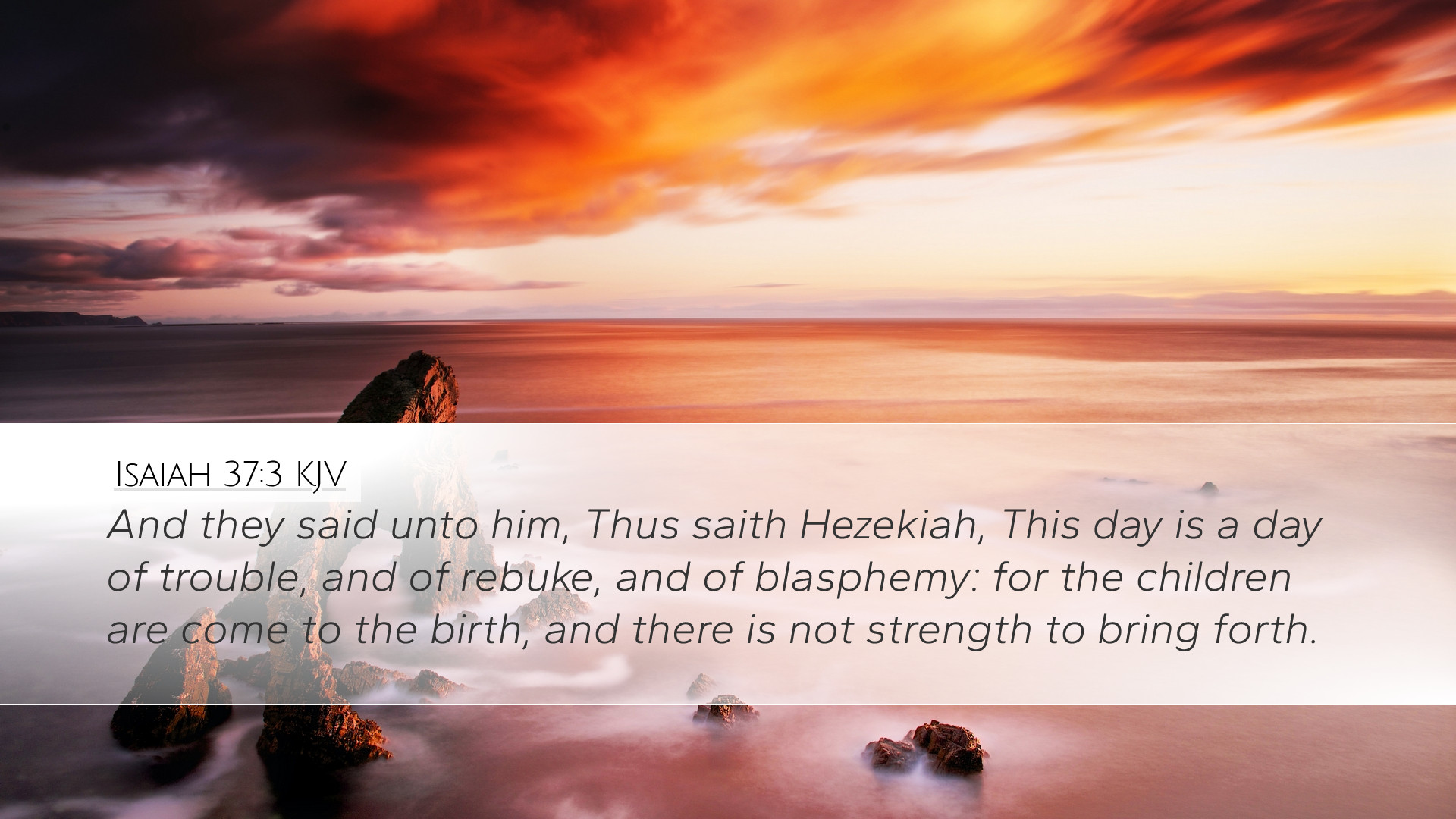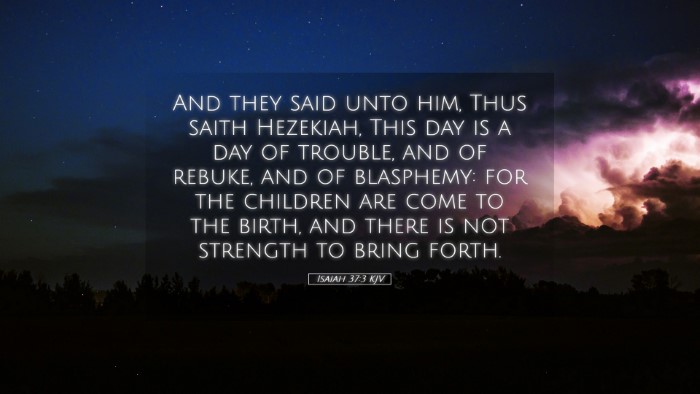Commentary on Isaiah 37:3
Isaiah 37:3 (ESV): "They said to him, 'Thus says Hezekiah: This day is a day of distress, of rebuke, and of disgrace; children have come to the point of birth, and there is no strength to bring them forth.'
Introduction
This verse captures a moment of profound despair and urgency. King Hezekiah, facing an overwhelming threat from the Assyrians, expresses a sentiment that resonates deeply through the ages—when a nation (or individual) is confronted by crisis, the sense of immediate need and inability to act can evoke feelings of helplessness. The commentaries by Matthew Henry, Albert Barnes, and Adam Clarke provide rich insights into the religious, historical, and theological context of this declaration.
Historical Context
- Setting of the Passage: Hezekiah was king of Judah during a time of serious military threat from Sennacherib, the king of Assyria. This context of warfare serves as the backdrop for Hezekiah's cry of distress.
- Assyrian Threat: Assyria was known for its might and cruelty. Their approach to Jerusalem posed a significant challenge to Hezekiah’s faith and leadership.
- Spiritual Implications: This moment illustrates the critical nature of relying on God's strength in times of trial, a theme prevalent throughout the prophetic literature.
Verse Breakdown
The verse presents several key insights that lend to its theological depth:
- Day of Distress: This phrase signifies a pivotal moment of suffering, where the weight of circumstances presses down heavily upon individuals and nations alike.
- Rebuke and Disgrace: Hezekiah acknowledges their moral and spiritual failings—reflecting perhaps a collective guilt that has contributed to their current plight.
- Imagery of Birth: The metaphor of childbirth suggests something vital and significant is at stake—there is a desperate need for deliverance that seems unreachable. The imagery evokes both hope (the potential for new life) and despair (the inability to bring forth that life).
Theological Reflections
As scholars and pastors engage with this verse, several theological reflections emerge:
- Human Vulnerability: Hezekiah’s declaration underscores human frailty in the face of overwhelming circumstances, reminding believers of their dependence on divine intervention.
- God's Sovereignty: Although despairing, there remains an implicit recognition that God rules over even the most dire situations. This tension between human distress and divine control is a recurring theme in Scripture.
- Call to Action: The acknowledgment of adversity serves not merely as a lament but as a call to seek divine help. In times of crisis, turning to God is imperative, as it reflects trust and reliance on His power.
Commentary Insights
Matthew Henry: Henry interprets this verse as expressing deep concern for spiritual and national integrity amidst crisis, emphasizing the need for earnest repentance and turning towards God. He reminds readers that distress can often be a precursor to divine help and liberation.
Albert Barnes: Barnes offers a detailed examination of the metaphors used by Hezekiah. He interprets the childbirth imagery as indicative of the urgency for God's salvation. Barnes highlights the emotional weight of this message, illustrating how despair can transport believers to a place where they fervently seek God's presence and aid.
Adam Clarke: Clarke takes a nuanced approach, delving into the remedial aspects of the text. He speaks of Hezekiah's acknowledgment of their state as crucial for understanding the nature of divine deliverance. Clarke points out that recognizing our own limitations is often the first step towards experiencing God’s grace and power.
Practical Applications
Engaging with Isaiah 37:3 provides significant lessons for contemporary pastors, students, and theologians:
- Encouraging Honesty in Lament: This verse invites churches and individuals to embrace lament as a pathway to communion with God—a necessary step in spiritual health.
- Promoting Faith Amidst Trials: The recognition of distress calls the faithful not just to mourn but also to seek a deeper understanding of God’s plans and purposes during difficult times.
- Building Community Support: In moments of crisis, the church community should strive to act as a support system, reflecting the collective nature of both suffering and deliverance.
Conclusion
Isaiah 37:3 serves as a profound reminder of the trials humanity faces while simultaneously pointing towards the hope found in seeking God's intervention. The diverse insights from the commentaries highlight how Scripture remains relevant through ages of suffering and conflict, encouraging believers to remain steadfast in seeking God during distressful times.


